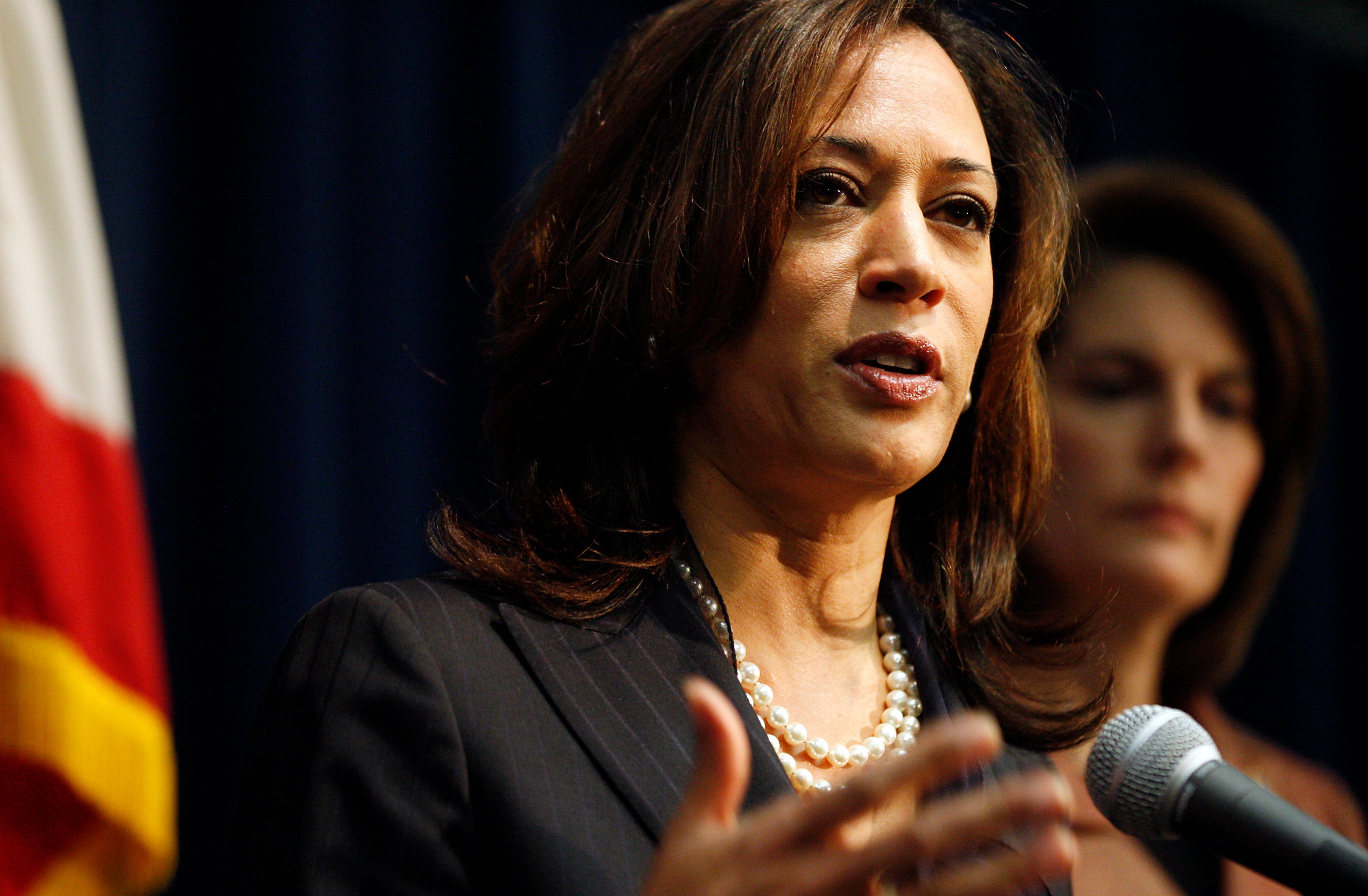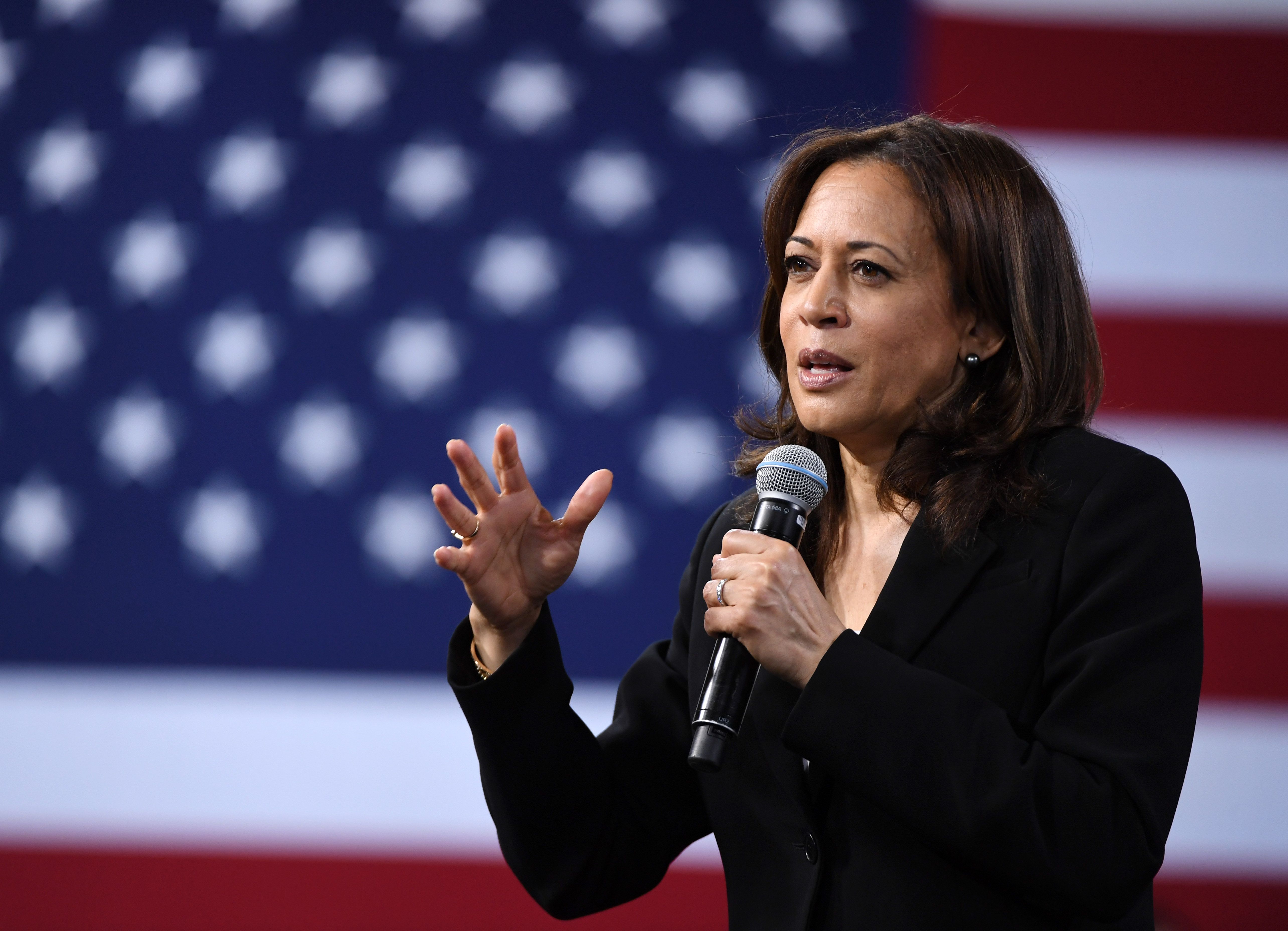
South Asian Activists Take a Critical Look at Kamala Harris
Many were quick to celebrate the vice presidential nomination of Kamala Harris, who became the first Black and South Asian woman to run on a major party's ticket after Joe Biden announced that she would be his running mate last month. For them, Harris, a 55-year-old senator from California, would infuse some much-needed progressivism and diversity into a party that has long lacked both.
Yet organizers on the ground approached her record-breaking nomination with caution. Her record as a prosecutor and as California's attorney general has at times created an irreconcilable rift between establishment politicians and the demands of contemporary grassroots movements, most notably those rising up today under the Black Lives Matter banner to protest police brutality and mass incarceration.
Now, as protesters continue to demand an end to state violence against Black lives, where does Harris fit into the picture?
To reckon with this question, BAZAAR.com speaks with South Asian activists about Harris's legacy. Below, Shahana Hanif, a candidate running for New York City Council in Brooklyn's 39th District, and organizers from Bangladeshi Americans for Political Progress (who requested to be quoted as a collective) reflect on the trajectory of Harris's career, her historic nomination, identity politics, and why we must hold elected officials accountable.
Many have celebrated Kamala Harris’s vice presidential nomination as the first Black and South Asian woman running mate to appear on a major presidential ballot. Did her historic nomination resonate with you?
Shahana Hanif: Kamala Harris’s nomination as a Black and South Asian woman is symbolic for my Bangladeshi-Muslim parents. I’m running for New York City Council, and if elected, I will be our city’s first-ever South Asian Muslim woman elected in office. It’s important for my parents to see that my run is possible and that winning is possible too.
Organizers with BAPP: The picture of Kamala with her family that surfaced during her presidential campaign struck a chord with many South Asian Americans. That picture—with sari-clad family members in a sepia-toned photo—could have been pulled from any of our family albums. For many of us, though, her nomination was overshadowed by the crises our nation was facing. As the Bangladeshi-American community in NYC was decimated by COVID-19, with scores more on the brink of eviction, the potential election of a South Asian woman didn’t feel like a win for our community. Rather, one individual’s win with most of us largely left behind.
This content is imported from Twitter. You may be able to find the same content in another format, or you may be able to find more information, at their web site.
Do you find that her candidacy represents your interests? Why, or why not?
SH: While I acknowledge the historical significance of her candidacy, we must also acknowledge Harris’s harmful prosecutorial and legislative history. Over the course of her career, she’s blocked legislation that would reform our criminal legal system, and instead, her decisions have emboldened law enforcement to get away with egregious misconduct.
When I think about the choices she’s made as a prosecutor and legislator, one who had countless opportunities to overturn a deeply inequitable criminal justice system, it’s a reminder for me that we must never stop holding our elected officials accountable. The candidates who represent my interests are those that are open to transparency, accountability, and collective power building rooted in restorative justice.
BAPP: As a group that centers the needs of working-class Bangladeshi Americans, we view her nomination as an exercise in harm reduction, attempting to curb the violence inflicted on our communities by the current administration. Every hate crime inspired by Trump’s white nationalist ideology, every xenophobic immigration policy that has separated our families has caused irreparable harm.
While we are concerned about her record as California’s attorney general, her voting record in the Senate, which is mostly progressive, gives us hope. We believe she is a career public servant who responds to pressure. We will continue to organize our communities to elevate our issues and ensure a Biden-Harris administration responds to our needs.
Her vice presidential nomination comes at a time of national uprisings, when many are beginning to question the efficiency of the police and the carceral institutions they uphold. Meanwhile, much of Harris’s political career was built within these very systems. What do you make of this?
SH: I support decarceration and police accountability by way of defunding police departments across the U.S. During the protests in NYC, I released my policy platform, Divest from the NYPD, Invest in Community Safety. For far too long, revisionist and incrementalist strategies have continued to incite violence against Black and Brown communities. I’d like to think there’s an opening for Harris to move in the direction of prioritizing the demands to defund policing and ending surveillance by way of federal policy.
BAPP: The war on drugs and the prison industrial complex started during the Reagan administration in the 1970s. Since then, we have actively incarcerated hundreds of thousands of Black and Brown community members. The propaganda from white supremacists about Black men being criminals and Black women being welfare queens has been so embedded in this country that even new immigrants that come into this country quickly internalize this narrative.
Kamala Harris’s position as attorney general from 2011 to 2017 has been criticized by many advocates throughout the country for harshly penalizing communities of color. We share this sentiment and also understand that these systems of oppression existed long before Ms. Harris. We as a nation must organize and dismantle these institutions and systems that oppress people of color. We must continue to hold those in power accountable, and that includes Kamala Harris.
Throughout this election, Harris has invoked her Indian upbringing and heritage. In your opinion, how does one’s own identity make a difference in how they navigate politics?
SH: Uplifting upbringing is an important part of the political trajectories of communities of color who’ve been sidelined by the political process. For example, I grew up in a working-class immigrant neighborhood in the district I’m running in, and class consciousness and struggle are part of my lived experiences as a disabled Bangladeshi-Muslim woman. This upbringing has shaped my visions for a city that doesn’t abandon or alienate working-class people. A deep understanding of Bangladeshi and Muslim heritage and history in NYC has also shaped my community and political organizing.
However, heritage cannot simply begin and end by, for example, making Eid or Diwali official holidays in schools. Bringing up heritage means advocating for an end to discriminatory practices, xenophobia, Islamophobia, and anti-Blackness, and ultimately working to improve the material conditions of BIPOC lives.
BAPP: One’s identity is important with regard to representation. While it is true that we have never witnessed a South Asian woman be nominated for vice president of the United States, we must be careful not to play into identity politics and forget about the candidates’ ideologies. Representation is meaningful insofar as the candidate or elected official’s policies authentically reflect the struggles of the communities they represent.

What issues matter most to you in this election?
SH: I care deeply about instituting a single-payer/Medicare for All plan. I’ve been navigating NYC’s nebulous health care system upon diagnosis with lupus since age 17. It baffled me that access to health insurance is tied to employment, and that as a sick and disabled woman, I needed to work to earn health care. I refuse this painful system for myself and those who rely on critical and frequent medical care and services.
So many families I know and work with have been impacted by our current administration’s immigration and Muslim bans. I would like to see the Biden–Harris ticket prioritize a sanctuary United States, abolish ICE, and reinstate naturalization fee waivers.
Gender equity and reproductive justice are also priorities. Harmful rollbacks across our cities continue to make it harder for survivors of sexual and gender-based violence to access resources for healing and justice. Biden’s sexual assault allegations are still fresh in my mind. The only way forward is to commit to survivors’ restoration.
BAPP: Economic justice, racial justice, health care, and climate change. We cannot allow runaway income and wealth inequality to prevail. Progressive taxation that uplifts the working class and ensures billionaires pay their fair share is not only moral, it creates security for all. Our destinies are intertwined.
So, when our Black siblings are murdered at the hands of the state, it harms us all. BAPP supports reallocating resources from bloated police budgets toward mental health and community support services.
This pandemic has shown how critical it is to have public infrastructure ready to address societal crises. Having a single-payer health system (Medicare for All) is one way to ensure our community health care needs are met even in the face of extenuating circumstances.
Finally, the climate crisis demonstrates the need for an intersectional approach to policy. As reported by The New York Times, it is often the poorest who pay disproportionately for the costs of climate change. Implementing a Green New Deal is essential to saving lives and providing good-paying jobs. BAPP will continue to advocate for the advancement of social justice in all sectors through our organizing efforts to build power in the Bangladeshi-American community.
Is there anything else you’d like to add?
BAPP: Much of our work is centered on local politics. We believe in electing strong progressives down the ballot to build a strong pipeline of public servants. We are proud of the courage of Nabilah Islam, Nina Ahmad, Shahana Hanif, Moumita Ahmed and Mary Jobaida–Bangladeshi American women who either ran or are running for office on issues deeply rooted in community. When our movements across the country translate to electoral wins locally, we believe we will start to move the needle on national policy. So while we disagree with Kamala Harris on many issues, we hope her nomination will inspire more South Asian women to run—and to win—on progressive platforms.
Chelsey Sanchez Assistant Social Media Editor Chelsey Sanchez is the Assistant Social Media Editor for HarpersBAZAAR.com, where she covers politics, social movements, and pop culture. This content is created and maintained by a third party, and imported onto this page to help users provide their email addresses. You may be able to find more information about this and similar content at piano.io